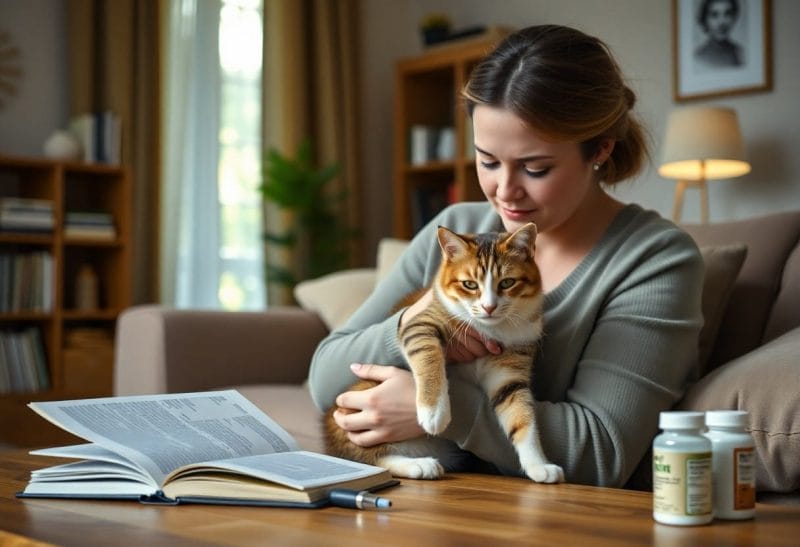How do I cure my sick cat? With your feline friend feeling under the weather, it’s imperative to act promptly and effectively. Understanding the symptoms and potential treatments can make all the difference in helping your cat recover. This guide will equip you with the necessary knowledge to assess your cat’s condition, seek appropriate veterinary care, and provide supportive home remedies, ensuring your beloved pet gets back to its playful self as soon as possible.
Key Takeaways:
- Consult a Veterinarian: Always seek professional advice if your cat shows signs of illness.
- Monitor Symptoms: Keep track of your cat’s symptoms, behavior, and any changes in appetite or energy levels.
- Provide Comfort: Ensure your cat has a calm environment, fresh water, and easy access to food to aid in their recovery.

Recognizing Signs of Illness in Cats
While cats are known for their independence, they can also hide signs of illness quite well due to their instinctual behavior. As a responsible pet owner, it’s important for you to remain vigilant and observant to detect any subtle changes in your cat’s behavior, appetite, or physical condition. By understanding these signals, you can identify potential health issues early and take appropriate action to ensure your feline friend receives the care they need.
Common Symptoms of Sickness
One of the first signs that your cat may be ill includes changes in their eating habits, such as a sudden increase or decrease in appetite. You might notice lethargy, unusual vocalization, or changes in litter box habits. Monitoring for signs like vomiting, diarrhea, or excessive grooming can also indicate underlying health issues that require your attention.
When to Seek Veterinary Help
When you observe persistent symptoms or notice a sudden change in your cat’s behavior, it’s time to consider consulting a veterinarian. Delaying care can worsen your pet’s condition, so you should act swiftly if you see concerning signs.
Understanding the importance of timely veterinary intervention can make a significant difference in your cat’s recovery. If your cat experiences symptoms such as difficulty breathing, severe vomiting, or unresponsiveness, these are warning signs that warrant immediate medical attention. Additionally, if your feline friend displays any symptoms that last longer than 24 hours or appear to be deteriorating, do not hesitate to contact your veterinarian for guidance and support.
Diagnostic Procedures
One of the first steps in determining how to cure your sick cat involves diagnostic procedures, which help identify the underlying health issue. These procedures generally include a thorough physical examination and various diagnostic tests or imaging, allowing you to gather vital information about your cat’s condition. By following these steps, you can better understand what your pet is facing and how best to address it.
Physical Examination
Procedures begin with a comprehensive physical examination by your veterinarian. During this assessment, the vet will check your cat’s vital signs, overall appearance, and specific areas of concern. This hands-on approach helps to pinpoint symptoms you may have noticed and can direct further diagnostic steps.
Diagnostic Tests and Imaging
To gain a clearer picture of your cat’s health, your veterinarian may recommend several diagnostic tests and imaging techniques. These can include blood tests, urinalysis, and X-rays or ultrasounds, aimed at revealing abnormalities that aren’t visible during a physical examination.
Diagnostic tests play a vital role in understanding your cat’s health status. Blood tests can evaluate organ function and detect infections, while urinalysis can reveal issues with the urinary system. Imaging techniques, like X-rays and ultrasounds, provide a non-invasive way to visualize internal structures, helping to identify tumors, fractures, or other concerns. Together, these methods allow you to gain comprehensive insights into your cat’s condition, guiding you toward the most effective treatment options.
Treatment Options
For addressing your cat’s illness, a variety of treatment options are available that can cater to their specific needs. Consult with your veterinarian to determine the most suitable path, which may include medications, therapies, or supportive care plans tailored to your cat’s condition. Taking quick action can significantly impact your cat’s health and recovery time, so don’t hesitate to seek professional advice.
Medications and Therapies
An effective treatment plan often includes medications and therapies prescribed by your veterinarian. These can range from antibiotics for infections to anti-inflammatory drugs for pain relief. Additionally, your vet may recommend therapies such as fluid therapy or nutritional support, ensuring your cat has the best chance for recovery.
Home Remedies and Supportive Care
Behind every successful treatment plan lies the importance of home remedies and supportive care. Simple measures, like hydration, a balanced diet, and a stress-free environment, can significantly enhance your cat’s recovery process. Implementing these at-home strategies in conjunction with veterinary care can promote your cat’s healing.
To provide the best supportive care, focus on creating a comfortable environment for your cat. Ensure they have easy access to fresh water and a nutritious diet to support their recovery. Monitor their health closely and provide gentle playtime to keep them engaged. Consider natural remedies like catnip or soothing music to help reduce stress. Always consult with your veterinarian before trying any new home remedies to ensure they are safe for your cat’s specific health condition.

Nutrition and Diet Management
Now, focusing on proper nutrition can significantly support your cat’s recovery. A well-balanced diet tailored to their specific needs is vital for strengthening their immune system. You can explore 8 Vet-Approved Home Remedies for Your Cat that can help enhance your cat’s diet during illness. Incorporating high-quality ingredients will aid in alleviating symptoms and speeding up healing.
Importance of Proper Nutrition
Before addressing any health issues, it’s vital to understand that nutrition plays a significant role in your cat’s overall well-being. A balanced diet provides the vital nutrients needed for healing and maintaining energy levels. By ensuring your cat receives a proper diet, you can better support their recovery process and promote a healthier lifestyle long-term.
Special Diets for Sick Cats
After determining your cat’s specific health needs, you may need to introduce a special diet that caters to their condition. Many illnesses require tailored nutrition that can aid in recovery, enhance digestion, or manage symptoms effectively. Consult with your veterinarian to design a meal plan that meets your cat’s unique requirements.
Plus, special diets may include veterinary-prescribed formulas designed to support specific health concerns such as renal disease, digestive issues, or allergies. These diets often contain adjusted protein levels, added fiber, or unique ingredients that promote better nutrient absorption. By providing your cat with a specialized diet, you can greatly improve their quality of life and overall health outcomes.

Recovery and Aftercare
Many pet owners overlook the importance of recovery and aftercare when their cat is sick. It is necessary to provide the right environment and care to support your furry friend in healing. Follow your veterinarian’s instructions closely and keep an eye on your cat’s progress, ensuring you remain vigilant during the recovery process. Providing emotional support and maintaining a healthy routine will foster a quicker return to health for your beloved companion.
Monitoring Your Cat’s Progress
Besides regular vet check-ins, it’s important to keep track of your cat’s daily habits to identify any changes. Take note of their eating, drinking, and elimination patterns, as these can provide insight into their recovery. Any noticeable changes in behavior or appetite should be promptly reported to your vet for guidance, ensuring you address potential issues swiftly.
Creating a Comfortable Environment
Aftercare involves ensuring your cat is in a soothing and safe environment while recovering. Make a designated area that is quiet, warm, and free from stressful stimuli, allowing your pet to relax and heal. Providing familiar bedding and personal items can also help make your cat feel secure during this time.
And, to further enhance your cat’s comfort, consider using soft blankets and pillows to create a cozy space for them. Minimize loud noises and disturbances, as this can hinder their recovery. You may also want to set up a litter box and food and water bowls nearby, reducing their need to move too far from their resting area. Keeping this environment calm and nurturing will help your cat feel loved and supported.
Preventative Measures
Keep your cat healthy and reduce the risk of illness by implementing routine preventative measures. Regularly assess your cat’s diet, exercise, and mental stimulation to ensure overall well-being. Additionally, check out this guide on How to care for a sick cat at home for more insights on maintaining your cat’s health.
Regular Vet Check-ups
Among the best strategies for preventative health care is scheduling regular vet check-ups. These visits enable early detection of potential health issues and allow your vet to provide guidance on maintaining your cat’s overall health.
Vaccinations and Health Maintenance
Health maintenance involves keeping your cat up-to-date with vaccinations, which protects against various diseases. Regular vaccinations will help ensure your feline friend remains healthy and protected from harmful pathogens that could lead to serious health concerns.
At these vet check-ups, your vet will recommend specific vaccination schedules tailored to your cat’s age, lifestyle, and health history. Discuss any concerns you have about potential risks, and follow your vet’s recommendations for boosters and preventive treatments like flea and tick control to maintain your cat’s health effectively.
Final Words
With this in mind, if your cat is unwell, prioritize a visit to the veterinarian for a proper diagnosis and tailored treatment plan. Monitor your cat’s symptoms closely, ensure they remain hydrated, and maintain a comfortable environment. Follow any medical advice or prescribed treatments diligently, as your proactive care can significantly aid in their recovery process. Stay informed about your cat’s health needs and be attentive to any changes in behavior or condition for optimal well-being.
FAQ
Q: What are the common signs that my cat is sick?
A: Cats can be quite adept at hiding their illnesses, but there are several signs you can look out for. These include changes in appetite (either increased or decreased), excessive grooming or neglect of grooming, lethargy, vomiting, diarrhea, changes in litter box habits, and unusual vocalization or behavior. If you observe any of these symptoms persisting for more than a day or two, it is advisable to consult with a veterinarian.
Q: What should I do if my cat has a fever?
A: If you suspect that your cat has a fever, the best course of action is to take her to a veterinarian for an evaluation. Cats typically have a normal temperature range of 100.5°F to 102.5°F (38°C to 39.2°C). A higher temperature can indicate an underlying infection or health issue. While waiting for the veterinarian’s appointment, ensure your cat is comfortable, hydrated, and has a quiet space to rest. Avoid giving any medications without veterinary approval, as human medications can be toxic to cats.
Q: How can I support my cat while she recovers from illness?
A: Supporting your cat during her recovery involves creating a peaceful and comfortable environment. Make sure she has a quiet space away from household activity where she can rest undisturbed. Encourage her to drink water and eat by offering her favorite foods in small, manageable amounts. Focus on providing easy access to her litter box. Additionally, follow the veterinarian’s instructions regarding medications and follow-up appointments closely. Observing her behavior and reporting any changes to the vet can also aid in her recovery process.










